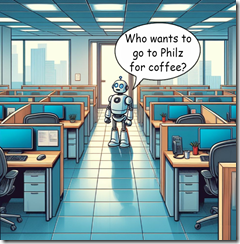AI and Jobs: Under Estimating Perhaps?
March 28, 2024
 This essay is the work of a dumb dinobaby. No smart software required.
This essay is the work of a dumb dinobaby. No smart software required.
I am interested in the impact of smart software on jobs. I spotted “1.5M UK Jobs Now at Risk from AI, Report Finds.” But the snappier assertion appears in the subtitle to the write up:
The number could rise to 7.9M in the future
The UK has about 68 million people (maybe more, maybe fewer but close enough). The estimate of 7.9 million job losses translates to seven million people out of work. Now these types of “future impact” estimates are diaphanous. But the message seems clear. Despite the nascent stage of smart software’s development, the number one use may be dumping humans and learning to love software. Will the software make today’s systems work more efficiently. In my experience, computerizing processes does very little to improve the outputs. Some tasks are completed quickly. However, get the process wrong, and one has a darned interesting project for a blue-chip consulting firm.
The smart software is alone in an empty office building. Does the smart software look lonely or unhappy? Thanks, MSFT Copilot. Good enough illustration.
The write up notes:
Back-office, entry-level, and part-time jobs are the ones mostly exposed, with employees on medium and low wages being at the greatest risk.
If this statement is accurate, life will be exciting for parents whose progeny camp out in the family room or who turn to other, possibly less socially acceptable, methods of generating cash. Crime comes to my mind, but you may see volunteers working to pick up trash in lovely Plymouth or Blackpool.
The write up notes:
Experts have argued that AI can be a force for good in the labor market — as long as it goes hand in hand with rebuilding workforce skills.
Academics, wizards, elected officials, consultants can find the silver lining in the cloud that spawned the tornado.
Several observations, if I may:
- The acceleration of tools to add AI to processes is evident in the continuous stream of “new” projects appearing in GitHub, Product Watch, and AI newsletters. The availability of tools means that applications will flow into job-reducing opportunities; that is, outfits which will pay cash to cut payroll.
- AI functions are now being embedded in mobile devices. Smart software will be a crutch and most users will not realize that their own skills are being transformed. Welcoming AI is an important first step in using AI to replace an expensive, unreliable humanoid.
- The floundering of government and non-governmental organizations is amusing to watch. Each day documents about managing the AI “risk” appear in my feedreader. Yet zero meaningful action is taking place as certain large companies work to consolidate their control of essential and mostly proprietary technologies and know how.
Net net: The job loss estimate is interesting. My hunch is that it underestimates the impact of smart software on traditional work. This is good for smart software and possibly not so good for humanoids.
Stephen E Arnold, March 28, 2024



